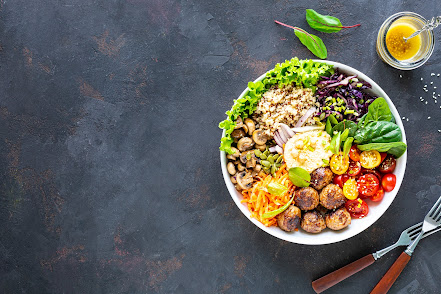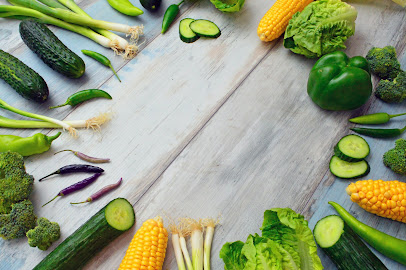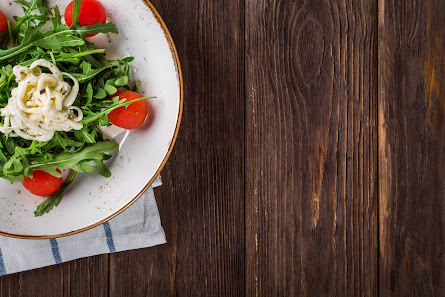Embracing Green: A Beginner's Guide to a Plant-Powered Lifestyle.
Introduction
Ever thought about giving your plate a green makeover? Enter the world of plant based diets, where veggies take center stage and fruits steal the spotlight. It's not just a trend; it's a delicious lifestyle that's all about munching on Mother Nature's finest offerings. Say bye-bye to meat and hello to a rainbow of nutrient-packed goodness—think leafy greens, vibrant fruits, hearty grains, and legumes that'll make your taste buds dance.But there's more to it than simply the taste factor—it's a health celebration! Consuming a plant-based diet has been associated with decreased risks of diabetes, heart disease, and even some malignancies. Also, it benefits the environment by lessening our environmental impact.
Prepare yourself for a delightful trip that is good for the environment and yourself, regardless of whether you are an experienced vegetarian or are just getting started.
Define Plant Based Diet:
A plant-based diet is all about embracing the power of plants for a healthier and more sustainable lifestyle. Simply put, it revolves around whole, plant-derived foods, steering clear of excessive animal products. Picture your plate filled with vibrant fruits, veggies, nuts, seeds, and grains—they're the stars of this nutritional show.The key is minimizing or, better yet, excluding animal products. That means less meat, dairy, and eggs, and more plant goodness. It's not about being a strict herbivore; it's about making plants the main act. Why? Well, plants bring a party of nutrients—fiber, vitamins, and antioxidants—that your body loves. Plus, it's an eco-friendly fiesta, as plant-based eating tends to be kinder to the planet.
So, next time you're pondering what's for dinner, think of the rainbow on your plate
How a Plant-Based Diet Works?
Eating everything that nature has to give is the secret to a plant-based diet! Rather than overindulging in animal products, one should nourish themselves by eating fruits, vegetables, grains, and nuts. The A-team of nutrients contained in plants are vitamins, fiber, and antioxidants.This perfect blend helps your body's natural functions, such boosting your immune system and maintaining heart health.
But there are also specific items, including dairy, eggs, and meat, that you should stay away from. By making this adjustment, you will lower your chance of getting chronic illnesses and help yourself maintain a healthy weight. Because it reduces your carbon footprint, it's a thumbs up.
- Plant-based diets are heart-healthy and reduce the chance of developing heart disease.
- Fruits, vegetables, and whole grains all help to reduce cholesterol and maintain heart health.
2.Weight Management:
- Ditch the practice of measuring calories! Because plant-based diets are inherently lower in fat and calories, maintaining a healthy weight is made simpler. Eat a lot of vegetables and feel the weight drop off.
3. Raise Your Nutrient Level:
- Vital nutrients present in plants include vitamins, minerals, and antioxidants.Eating a plant-based diet guarantees that your body receives a variety of nutrients, many of which are advantageous to your general well-being.
4.Gut Happiness:
- The high fiber content of plant-based diets helps to maintain a happy and healthy gut. Fiber helps keep your belly happy by promoting a healthy microbiome, preventing constipation, and assisting with digestion.
5.Eco-Friendly Living:
- Eating a plant-based diet benefits the earth as well as you! Diets based mostly on plants have less of an impact on the environment, leaving a smaller carbon footprint and promoting sustainability.
Types of Plant Based Diets
1.Vegetarianism:
- Omits fish, poultry, and meat.
- Accepts eggs and dairy products.
2.Veganism:
- Excludes dairy and eggs, as well as all animal products.
- Emphasizes foods high in plant matter, such as grains, legumes, fruits, and vegetables.
3.Flexitarian:
- Mostly plant-based, with the occasional meat meal.
- Enables adaptability based on individual preferences.
4.Pescatarian:
- Plant-based with the inclusion of fish and seafood.
- Excludes other types of meat.
5.Raw Food Diet:
- Emphasizes raw, uncooked foods like fruits, vegetables, nuts, and seeds.
- Preserves nutrients believed to be lost during cooking.
6.Whole Food Plant-Based (WFPB):
- Focuses on whole, minimally processed plant foods.
- Eliminates or limits refined and processed foods.
7.Mediterranean Diet:
- Plant-based with an emphasis on olive oil, fruits, vegetables, and whole grains.
- Includes moderate amounts of fish and dairy.
A Plant Based Diet Guide: A List of Foods to Eat, Limit, and Avoid
What to Eat and Drink
1.Vegetables Abound:
- Stuff your plate with vibrant vegetables including bell peppers, broccoli, and carrots.
2.Fruit Fiesta:
- For a natural sugar surge, eat sweet fruits including bananas, apples, and berries.
3.Whole Grains:
- For a filling supper, choose whole wheat, quinoa, and brown rice.
4.Protein Power:
- For a protein-rich punch, lentils, beans, and tofu are your new best friends.
5.Nuttish Pleasures:
- For a crunchy and nourishing snack, munch on almonds and seeds.
6.Alternatives to Dairy:
- If you want calcium without the moop, try soy or almond plant-based milk.
7.Healthy Fats:
- Olive oil and avocados provide a tasty boost of healthy fats.
8.Hydration Heroes:
- Drink plenty of water, herbal teas, and fresh fruit juices to stay hydrated.
Limit or Avoid Food On Plant Based Diet
1.Reduce Processed Foods:
- For improved health, cut back on the amount of processed meals and snacks you eat.
2.Watch the Sugar:
- Pay attention to the amount of added sugar in drinks and desserts.
3.Moderate Fats:
- Although fats are necessary, choose healthy fats from nuts and avocados instead of consuming too much oil.
Reduce Salt:
- Steer clear of highly processed and salted foods to lower your sodium intake.
- Vegan junk food should be avoided because it's not always nutritious just because it's plant-based. Watch your vegan delights.
Be Careful with Carbs:
- For long-lasting energy, choose whole grains over refined carbs.
- Steer clear of highly processed meat substitutes; tofu and lentils are good full protein sources instead of substitutes that are heavy in chemicals.
7 Tips for Plant Based Diet Beginners
1.Start Slow:
- Don't dive headfirst into a veggie feast. Begin by swapping one meal a day with plant-based options, allowing your taste buds to adapt.
2.Explore Variety:
- Plant-based doesn't mean boring! Dive into a rainbow of fruits, veggies, legumes, and grains. Try quinoa, lentils, kale, and a medley of colorful produce.
3.Protein Power:
- Ensure you get enough protein by including beans, tofu, nuts, and seeds. These plant pals will keep you strong and satisfied.
4.Read Labels:
- Keep an eye out for sneaky animal-derived ingredients. Scan labels for hidden dairy or mysterious additives.
5.Plan Ahead:
- Arm yourself with snacks and meals. A little planning prevents desperate dashes to the nearest fast-food joint. Prep salads, chop veggies, and have plant-based snacks on hand.
6.Educate Yourself:
- Know your nutrients. Plant-based diets can lack certain vitamins and minerals, so educate yourself on proper substitutes and supplements.
7.Stay Hydrated:
- Water is your BFF. Hydration aids digestion and keeps cravings at bay. Spice it up with herbal teas or infuse it with fruits for a tasty twist.
Bust Myths:About Plant based diets
Myth 1: Lack of Protein
Reality:
- Plants are protein-packed! Lentils, beans, tofu, and even broccoli are excellent sources of protein. A well-balanced plant-based diet can meet your protein needs.
Myth 2: Boring and Tasteless
Reality:
- Plant-based meals are a burst of flavors! From vibrant salads to hearty veggie stir-fries, the variety is endless. Spices and herbs add zest without sacrificing health.
Myth 3: Low in nutrients
- The truth is that plant-based diets are rich in nutrients. Nuts, seeds, fruits, and vegetables all include vitamins, minerals, and antioxidants that are vital for overall health.
Myth 4: Only Vegetarians Can Benefit from Plant-Based Diets Reality:
- Plant-based diets don't require veganism to be beneficial. Eating a diet higher in plant-based foods can enhance your health and reduce your impact on the environment, even if you occasionally consume animal products.
Myth 5:
Expensive Reality:
- A plant-based diet is not always prohibitively expensive. Seasonal fruit, rice, and beans are affordable staples. Avoid processed plant-based products in favor of a more affordable and wholesome choice.
7 Day Simple Menu
- For vitality, start your day with a large dish of oats topped with berries and a few almonds.
Snack:
- For a mid-morning energy boost, eat some fresh fruit, such as bananas or apples.
Lunch:
- Savor a vibrant salad stuffed with vegetables, leafy greens, and a source of protein, such as tofu or chickpeas.
Snack in the Afternoon:
- A handful of mixed nuts can provide you with a filling and healthy energy boost.
Dinner:
- Supper is a tasty stir-fried quinoa with a bunch of vegetables and a splash of soy sauce.
Hydration:
- Drink plenty of water, herbal teas, or flavored water to stay hydrated throughout the day.
Day 2 plant based diet:
Breakfast :
- A big bowl of oats with fresh berries and chia seeds for energy is what I have for breakfast. What a fantastic way to start the day this is.
Snack:
- Eat a banana and some nuts to ward off those mid-morning hunger pangs.
Lunch:
- A colorful salad with cucumber, cherry tomatoes, mixed greens, and a generous drizzle of balsamic vinaigrette is what I have for lunch.
Afternoon Snack:
- Carrot sticks and hummus are a delicious and nutritious way to sate your appetite.
Dinner :
- We're having a delicious stir-fried quinoa dinner with bell peppers, broccoli, and tofu for protein.
Day 3 Plant Based Diet
Morning meal (7:00 AM):
- Almond milk and berries with a dash of chia seeds on top of oatmeal.
- Herbal tea or green tea.
11:00 AM Mid-Morning Snack:
- A handful of mixed nuts, including cashews, walnuts, and almonds.
- pieces of apple.
Lunchtime (1 PM):
- Quinoa salad with black beans and a rainbow of vibrant vegetables.
- Carrots and broccoli steam-cooked on the side.
- Water with freshly squeezed lemons.
4:00 PM Afternoon Snack:
- Carrot and cucumber sticks with hummus.
- A tiny bowl of mixed salad fruits.
Dinner at 7:00 p.m.
- Sweet potatoes baked and drizzled with olive oil.
- Asparagus on the grill with quinoa.
- Herbal tea to finish on a calm note.
Day 4 plant based diet:
Breakfast:
- A large bowl of porridge topped with berries and almonds can help you feel more energised.
Snack:
- Eat a handful of almonds for a consistent rise in protein and energy.
Lunch:
- Dig into a colorful salad loaded with veggies, including tomatoes, cucumbers, and leafy greens. Quinoa is a good way to add some nutrition.
Afternoon Snack:
- Almond butter and apple slices provide a nutritious and delectable combo that will quench your appetite.
Dinner :
- Dinner is a delicious stir-fry made with tempeh or tofu, colorful vegetables, and brown rice.
Dessert:
- Indulge guilt-free in a refreshing sorbet or fruit salad.
Hydration:
- To stay hydrated during the day, sip on lots of water, herbal teas, or flavored water.
Day 5 Plant Based Diet Plan:
Breakfast:
- Energize with a smoothie – blend bananas, berries, and almond milk.
Snack:
- Munch on a handful of mixed nuts for a protein boost.
Lunch:
- Savor a colorful salad with spinach, chickpeas, and a zesty vinaigrette.
Afternoon Snack:
- Dip carrot and cucumber sticks in hummus for a tasty crunch.
Dinner:
- Enjoy a hearty lentil soup with whole-grain bread on the side.
Dessert:
- Treat yourself to a fruit salad drizzled with a touch of maple syrup.
Hydration:
- Stay hydrated with herbal teas and plenty of water throughout the day.
Day 6 Plant Based Diet Plan: Energize Your Week!
Breakfast Boost:
- Start with a hearty oatmeal bowl topped with fruits and nuts.
- Green tea for a refreshing kick.
Mid-Morning Snack:
- Grab a handful of mixed berries for a sweet, antioxidant-packed treat.
Lunch Delight:
- Quinoa salad with a rainbow of veggies.
- Lentil soup for protein punch.
Afternoon Pick-Me-Up:
- Sip on a green smoothie for a nutrient-packed lift.
Dinner Delicacy:
- Baked sweet potatoes with black bean salsa.
- Steamed broccoli on the side.
Bedtime Soothe:
- Herbal tea to unwind.
Day 7 Plant Based Diet Plan:
Breakfast:
- Start with a hearty bowl of oatmeal topped with fresh berries and nuts for energy.
Mid-Morning Snack:
- Grab a handful of almonds or an apple to keep you going until lunch.
Lunch:
- Enjoy a colorful salad with a variety of veggies, chickpeas, and a light vinaigrette dressing.
Afternoon Pick-Me-Up:
- Opt for a green smoothie or a piece of whole-grain toast with avocado.
Dinner:
- Roasted vegetables, quinoa, and a side of steamed broccoli make a satisfying and nutritious meal.
Evening Snack:
- Munch on some air-popped popcorn or a small serving of mixed nuts.
Hydration:
- Throughout the day, stay hydrated with water, herbal teas, or infused water for added flavor.
FAQ's
1. What is a plant based diet?
- A plant-based diet is centered around foods that come from plants, such as fruits, vegetables, grains, nuts, and seeds. It minimizes or excludes animal products like meat, dairy, and eggs.
2. Can I get enough protein from a plant based diet?
- Absolutely! Plant-based sources like beans, lentils, tofu, and quinoa provide ample protein. Combining different plant foods ensures you get all essential amino acids.
3.Will I get enough vitamins and minerals?
- Yes, a well-balanced plant-based diet can provide all necessary nutrients. Focus on a variety of colorful fruits and vegetables, whole grains, and fortified foods for a broad spectrum of vitamins and minerals.
4. How do I transition to a plant based diet?
- Start gradually by incorporating more plant foods into your meals. Experiment with new recipes and find plant-based alternatives for your favorite dishes. It's about making sustainable changes.
5. Is a plant based diet suitable for all ages?
- Yes, it can be suitable for all stages of life, including children, teens, adults, and seniors. Pay attention to specific nutrient needs, such as B12, and consult with a healthcare professional for personalized advice.





.jpg)










Post a Comment
0Comments